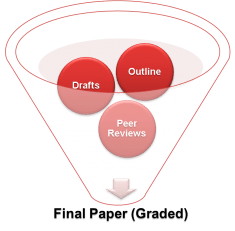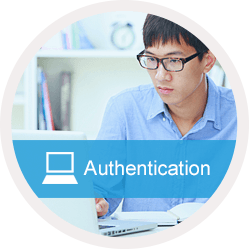Instructors generally want to promote honesty and integrity along with building their students' knowledge and skills. However, this can be challenging, particularly in online settings. That is because academic dishonesty is a complex issue of motivations and cultural pressures.
Types of Academic Dishonesty

Academic dishonesty includes the following:
Cheating -- relying on others' work as their own
Plagiarism -- relying on others' words as their own
Facilitation -- providing work for other students to use
Misrepresentation -- presenting others' work as their own
Failure to contribute -- allowing other group members to do all of the work
Sabotage -- negatively influencing other learners' work
Why Are Students Dishonest?
 It's important to understand reasons for academic dishonesty as a step in preventing it. The reasons may include cultural, social, academic and/or personal. Following are examples:
It's important to understand reasons for academic dishonesty as a step in preventing it. The reasons may include cultural, social, academic and/or personal. Following are examples:
- Open sharing culture is filled with sharing. Everyone's words, images, favorite music, videos, or other materials are part of an open and fluid sharing process on social media and from Internet searches. Often the time is not taken to credit the original source.
- Cultural differences – not all cultures have the same viewpoints on ethical reuse and citation.
- Peer pressure – even perceived peer pressure – can lead to dishonesty. The online setting can feel isolating. If students believe that other students are or may be cheating to gain advantage, they may feel pressured to cheat as well.
- Parental and family pressures, real or perceived, can lead students to dishonesty. Expectations create intense pressures to succeed. When expectations are unrealistic, the pressure may lead to desperate dishonest measures.
- Societal pressures can also contribute to dishonesty. Our society offers economic rewards for academic success, creating pressure to succeed through school and potentially on to college or training and professional careers.
- Instructor inflexibility creates pressure that can lead to dishonesty. If the student knows the teacher will not be flexible with due dates, even when circumstances are beyond the student's control, that student may feel his/her only recourse is to cheat.
- Collaboration versus Cheating is unclear to students The online environment can feel very isolating to a student. Collaborating with other students is a way to connect to others in the class. When students get together to study for a class or to complete assigned group work, we applaud the behavior. When they get together to complete other kinds of assignments we call it “cheating.” This distinction is not always clear to the student.
Additional Resources:
1) Stavredes, T. (2011). Strategies for managing ethical and legal issues. Effective online teaching: Foundations and strategies for student success (pp. 223-240). San Francisco, CA: Wiley & Sons, Inc.

Academic Misconduct
The University believes that academic honesty and integrity are fundamental to the mission of higher education and of the University of Wisconsin System. The University has a responsibility to promote academic honesty and integrity and to develop procedures to deal effectively with instances of academic dishonesty.
Students are responsible for the honest completion and representation of their work, for the appropriate citation of sources, and for respect of others' academic endeavors. Students who violate these standards are subject to disciplinary action. UWS Chapter 14 identifies procedures to be followed when a student is accused of academic misconduct. For additional information, please refer to the section in the Student Handbook entitled Student Academic Disciplinary Procedures.
Please review the Student Academic Misconduct Policy and the Student Non-Academic Misconduct Policy
Are there really more academic dishonesty issues in an online course?
The topic of academic dishonesty often comes up when people discuss online student assessment. Some recent reports indicate that digital technologies are changing the ways that teen students cheat, such as using cell phones to share test answers or plagiarizing information from the Internet.
A 2011 Pew Research Center study of college presidents suggests that college students are also cheating more. A majority of the college presidents (55%) in the study indicated that plagiarism in students' papers has increased over the past ten years, with 89% of those respondents believing that computers and the Internet have had a big role in the increase.
Still, despite the perception that academic dishonesty is much more common online than in traditional classrooms, the research evidence about cheating online has not yet validated that perception, with different studies yielding different conclusions. One study at Ohio State, for example, found that online students that signed an honor code cheated more than those in a mostly face-to-face course (LoSchiavo & Shatz, 2011).
Another study of over 600 undergraduate and graduate students, for example, reveals a more nuanced picture (Watson & Sottile, 2010). Overall, they found more academic dishonesty in face-to-face courses; however, one specific behavior was much more prevalent online: seeking answers from a classmate during online tests or quizzes.
References:
- The Digital Revolution and Higher Education, Pew Research Center (2011)
- LoSchiavo, F. M., & Shatz, M. A. (2011). The impact of an honor code on cheating in online courses. MERLOT Journal of Online Learning and Teaching,7(2).
- Watson, G. R., & Sottile, J. (2010). Cheating in the digital age: Do students cheat more in online courses?
Checklist of Best Practices to Promote Academic Integrity
So what can instructors do to ensure that their students act honestly and with integrity?
Instructors can improve students' commitment to academic integrity by clearly spelling out honesty expectations, teaching citation skills, emphasizing the educational benefits of a course, and other techniques. It is also important to address known and suspected academic dishonesty.
There are a number of useful guidelines for instructors:
- Best Practices to Promote Academic Integrity in Online Education (WCET, ITC, and UT TeleCampus)
- Designing Online Courses to Discourage Dishonesty
- At UW-Madison, the Office of the Dean of Students, Writing Across the Curriculum and The Libraries have published useful guidelines.
Key recommendations from these resources and others resulted in the following checklist is a useful tool for determining which issues you might want to be aware of and plan to address as you design and teach online courses.
Consider: Which of these strategies might be appropriate and helpful ways to promote academic integrity and reduce cheating and plagiarism issues in your course?
- Clearly state the academic misconduct policy. Include a statement of the institution’s as well as your own academic honesty and integrity expectations and the consequences for dishonesty early in your online course. In the "Course Orientation" information, university policies including academic misconduct were listed. It is important to include this information and emphasize the importance of honesty and integrity in the course.
Tip: Involve students in defining and committing to an honor code of honesty and integrity by signing their name to an official document.
- Define cheating and plagiarism. Ensure that students understand what cheating and plagiarism are and how you will handle suspected cases.
Tip: Engage your students early on in your online course in an activity that surfaces their ideas and attitudes about plagiarism and cheating. For example, students can take a quiz like the example in the box below or you can provide examples/cases for them to discuss.
- Require Students to Take a Quiz:
Identify the Rules and Agree to Academic Honesty Policy
Source: Colorado University Toolkit
A short quiz or questionnaire given at the beginning of the class covering issues of academic honesty serves a dual purpose. First, it ensures that students understand the honesty policies. In many cases, students do not know they are cheating. Especially when it comes to plagiarism and citation, make sure that they know the rules!
Second, it forces them to explicitly agree to the policy. Both knowledge and agreement can help minimize the desire to cheat.
Some sample questions include:
- Define plagiarism: (short answer)
- Plagiarism is:
- Using someone’s words without attribution
- Using someone’s ideas without attribution
- Extensive borrowing from source material
- All of the above
- After taking an exam, it’s is OK to talk about the test and share answers with a friend in another section of the same class to help him or her prepare:
- True
- False
- In an online course, it’s OK to have someone look over your test answers and make suggestions before submitting the test:
- True
- False
- Paying someone to write a paper for you is an example of:
- Cheating
- Plagiarism
- Both
- A formal agreement might include:
- I understand what constitutes plagiarism in this class and promise not to plagiarize.
- I understand the university’s academic honor code and discipline policies and promise to uphold them.
- I understand that if I cheat or plagiarize in this course the consequence may include immediate failure of the course.
- I understand that the instructor may use tools to check for plagiarism.
- Be noticeably present in the course. An instructor who appears to be absent from the course or uninvolved in activities contributes to an environment conducive to cheating.
- Use multiple assessment methods. Personalized, authentic assessments may make cheating less feasible, and may make individual effort more appealing, This includes not only tests and quizzes but also interactive discussions, written assignments, case studies, projects, reports, presentations, role plays, and self-check quizzes with feedback, etc.
 Tips: A greater reliance on written and other, more subjective assessments is recommended for online environments. For these written assignments, require the submission of drafts or outlines and resources planned to see the student's work in progress. Also, include peer review. Some instructors find annotated bibliographies with annotations that explain how the sources inspired a student's research a good strategy to ensure both quality resources and individualized discovery.
Tips: A greater reliance on written and other, more subjective assessments is recommended for online environments. For these written assignments, require the submission of drafts or outlines and resources planned to see the student's work in progress. Also, include peer review. Some instructors find annotated bibliographies with annotations that explain how the sources inspired a student's research a good strategy to ensure both quality resources and individualized discovery.
- Set multiple due dates for segments of work.
- Ask each student to log their work, answer questions about their research methods, or journal about their progress.
- Require students to place the following phrase at the end of a major paper:
“I certify that the writing contained in this paper is my own and that any direct quotations have been identified and cited. Additionally, I have cited references in any place where I have significantly borrowed someone else’s ideas.”
- Ensure that your objectives and criteria for assessing work are clear and detailed enough for students to understand what is expected of them.
Tip: Provide rubrics and/or examples of quality work. Provide resources for good citation examples.
- What is collaborative and what is individual work? Clearly identify what types of work are to be completed individually, with a partner, or as a member of a small group.
Tip: Assign students to partners or groups, and assign each partner or group member to a specific contribution to the task or project.
- Grade often so individual assignments are worth fewer points and doing this lowers the incentive to cheat. For another, grading often increases the effort required to cheat because of the frequency of the assignments. this is a good practice for any online course since it helps the students pace themselves in the asynchronous environment.
Tip: Use Classroom Assessment Techniques (CATs) to assess student learning frequently.
Additional Tips:
-
Plan in advance how to deal with academic dishonesty. If you caught a student cheating today, do you know exactly what you would do? How will you test for cheating? Who would you contact in your department? What would you say to the student(s)? How do you resolve or escalate the case? Be prepared for decisive action.
-
Use secure student logins and passwords to access online courses and related resources, discussions, assignments, and assessments. Course management systems, like Desire2Learn and Moodle, have this security as well as the Google Apps provided by UW-Madison.
- Consider using plagiarism detection software such as TurnItIn or Viper. Many plagiarism detection services have both free and fee-based options, the former for the individual user and the latter for institutional licenses.
- Familiarize yourself with general cultural views on reuse. See http://iteslj.org/Articles/Yusof-Plagiarism.html
Tips for Quizzes/Exams
Students might share answers with other students via text message, talk on the phone or chat while they are taking the test, or exchange login information so that one student can complete the assignment using another student's identity. While not perfect solutions, following are ideas to reduce cheating in online quizzes and exams.
- Randomize the questions and give a time limit (most learning management systems provide these options).
- Use test banks that draw questions randomly so that students do not answer all the same question (many textbook publishers offer test banks). Instructors will need to choose or design question bank questions thoughtfully so that all students are assessed on all the learning objectives.
- Proctor an exam at a testing location or use camera equipment. Consider using proctoring services such as Kryterion or Software Secure’s Remote Proctor for critical exams.
Unless instructors know their students and their work, these measures may not prove effective. Instead, it may be worthwhile to change the purpose of online quizzing or and exams and focus on other assessment strategies. For example, Academic Partnerships (2012) suggests that all exams should be open book, that automated exams should not figure prominently in online courses.
Tip: All courses should provide information on university policies for academic misconduct in either in the syllabus or in the course site. Feel free to use the following policy description and links in your course.
Content was modified from the following references:
- UW-River Falls Faculty and Academic Staff Development department.
- Colorado University Toolkit, which summarizes issues, solutions and resources surrounding academic honesty in online courses for Colorado University Online.
Personal Communication is the Best Strategy
 Often if the instructor suspects dishonesty, he/she will talk with a student individually. This is still possible in an online setting. You can schedule a video conference call with a tool such as Skype or Blackboard Collaborate to allow a virtual face-to-face conversation with the student. While phones provide an alternate means of conferencing, audio conversations may not be as impactful as video calls. If necessary, official written warnings or notices may be attached to emails.
Often if the instructor suspects dishonesty, he/she will talk with a student individually. This is still possible in an online setting. You can schedule a video conference call with a tool such as Skype or Blackboard Collaborate to allow a virtual face-to-face conversation with the student. While phones provide an alternate means of conferencing, audio conversations may not be as impactful as video calls. If necessary, official written warnings or notices may be attached to emails.
In summary, students need to know that their instructor expects honesty and integrity in their academic work. Involving students in writing and signing an honor code can be a powerful deterrent. However, students also need to understand that their teacher will take measures to detect and prevent dishonesty in all forms. Clear expectations and due dates are needed, as is some flexibility based on a student's needs or situation. If all else fails, virtual face-to-face conferences and follow-up warnings or notices may be needed.
